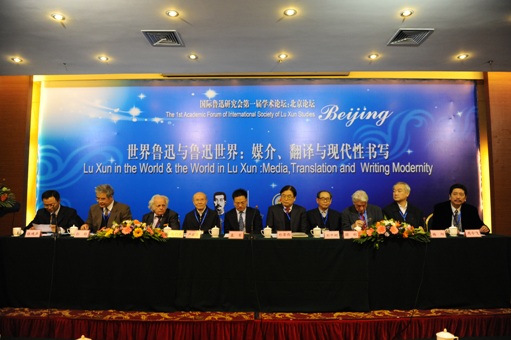Rediscovering Lu Xun and his place in Modernist literature

Communication University of China hosts the forum to discuss Lu Xun Studies
The First Academic Forum of the International Society of Lu Xun Studies was held from November 8-11 in Beijing, honoring the first anniversary of the Society’s establishment as well as the hundredth anniversary of the influential writer’s arrival in Beijing. The Forum was co-hosted by the International Society of Lu Xun and Communication University of China, drawing more than experts from China, Korea, Germany, Italy, and other countries. The attendees discussed the theme “Lu Xun in the World and the World in Lu Xun: Media, Translation and Writing Modernity.”
The literature and thoughts of Lu Xun hold world value, and the study of his work has become an important subject internationally. In 2009, the Survey on the Social Influence of Lu Xun, part a broader research project on the Lu Xun’s thought, showed that Lu Xun is a big influence among intellectuals overseas.
Park Jae-woo, president of International Society of Lu Xun Studies, detailed seven types of intellectuals influenced by the writer, including thinkers, creators, researchers, and general readers, among others. He pointed to the enduring spiritual power and ideological core of Lu Xun’s work, noting its inspiring effects in South Korea’s democratization movement. In a presentation entitled “Lu Xun’s Influence on Korean Intellectuals in the 21st Century,” Park further explicated his continuing influence with contemporary Korean intellectuals, and noted that the writer’s perspective offers a new paradigm for South Korean cultural history.
Zhou Lingfei, vice president of the International Society of Lu Xun Studies, added that Lu Xun’s deep grounding in Chinese history and culture, combined with his awareness of country’s national fate, has won him worldwide recognition and praise. Displaying familiarity with both Eastern and Western thought, Zhou noted that the synthesis manifest in Lu Xun’s work offers new insights into the ethical and cultural development of China.
“Lu Xun and Modernist Writing” was one of the central topics discussed at the forum. Wolfgan Kubin, a professor at Bonn University and Beijing Foreign Studies University, identified Lu Xun as a pillar of the May 4th movement and one of the most archetypical modernist writers, defining the literary style with his grasp of history and philosophical discussion of human fate. Kubin stressed that the study of Lu Xun must use the writer’s work as its basis, attempting to understand the multiple voices that emerge in his literature.
Yang Sai is reporter from Chinese Social Sciences Today
Chinese Social Sciences Today, No.378, Nov 12, 2012
(Translated by Yang Lu)

 PRINT
PRINT CLOSE
CLOSE